Annette has a number of uncles, cousins and in-laws who are hunters. Her uncle Klaus is probably the most avid of her hunting relatives. Fortunately for him, he owns several forests abundant in wildlife, and he has the means to organize multiple hunting parties each year. These are parties in two senses of the word: a large group of people headed into the woods, and a celebration with family and friends.
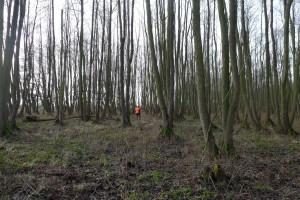 In mid November, Klaus hosted his annual fall hunt near the hamlet of Lauenhagen, about one-and-a-half hours north of Berlin by car. Annette’s parents live in the village, as does her uncle Hartmut, who farms the surrounding land. Klaus’s large country manor house dominates the approach to Lauenhagen. Another uncle owns a house nearby.
In mid November, Klaus hosted his annual fall hunt near the hamlet of Lauenhagen, about one-and-a-half hours north of Berlin by car. Annette’s parents live in the village, as does her uncle Hartmut, who farms the surrounding land. Klaus’s large country manor house dominates the approach to Lauenhagen. Another uncle owns a house nearby.
The hunting party began with a dinner on Friday evening in the hunting lodge, a renovated stone barn located on the far side of the courtyard in front of Klaus’s house. Annette and I missed the dinner because we had tickets to see a concert in Berlin that evening, but we arrived on Saturday morning in time for the pre-hunt breakfast. We borrowed rubber boots — Gummistiefel — and loaded up on eggs, bacon, rolls and coffee. We then gathered with the other participants in the courtyard.
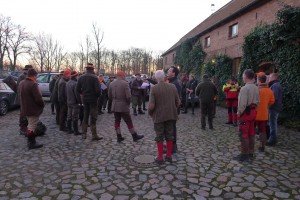 The group presented an interesting picture. The hunters numbered about twenty, and were identifiable by their rifles. Most were friends of Klaus in their fifties and sixties, and looked as if they had stepped out of the pages of Town and Country magazine. Many of the hunters were wearing tweed; several wore ties. I recognized one of the hunters as “Der Kleine Baron,” a genial man and a forester by training who is a regular at Klaus’ parties. He is certainly short, and he is truly a baron, in the aristocratic sense: Baron von Brandenstein. In contrast, a few of the men carrying rifles were hewn from rougher stock — they appeared to be local farmers or craftsmen. I learned later that they would be helping to organize and lead those of us who were not hunting — the so-called Treiber. The group of hunters was rounded out by several other of Annette’s uncles and cousins. Their outfits and demeanor helped to bridge what I couldn’t help thinking of as the divide between the aristocrats and the peasants.
The group presented an interesting picture. The hunters numbered about twenty, and were identifiable by their rifles. Most were friends of Klaus in their fifties and sixties, and looked as if they had stepped out of the pages of Town and Country magazine. Many of the hunters were wearing tweed; several wore ties. I recognized one of the hunters as “Der Kleine Baron,” a genial man and a forester by training who is a regular at Klaus’ parties. He is certainly short, and he is truly a baron, in the aristocratic sense: Baron von Brandenstein. In contrast, a few of the men carrying rifles were hewn from rougher stock — they appeared to be local farmers or craftsmen. I learned later that they would be helping to organize and lead those of us who were not hunting — the so-called Treiber. The group of hunters was rounded out by several other of Annette’s uncles and cousins. Their outfits and demeanor helped to bridge what I couldn’t help thinking of as the divide between the aristocrats and the peasants.
Annette, Rani and I would be participating as Treiber. This translates as “beaters” or “drivers,” although it was explained to me later that this hunt was more of a Drückjagd — a pushing or pressure hunt — than a Treibjagd. A Treibjagd generally goes after smaller game like rabbits, and the Treiber literally beat the bushes. The goal of our Drückjagd was larger game.
There were at least as many Treiber as hunters. Most were members of Annette’s family, which is quite large on her father’s side. Klaus’s two teenage children were participating with friends of theirs from Berlin. The four Treiber off by themselves on the edge of the group were pointed out to me as “The Poles.” These young craftsmen from Poland have been on a sort of permanent retainer to the Keunecke family for the past few years. They have undertaken renovation projects for various family members in Berlin, Bonn, Lauenhagen and elsewhere, executing them with a combination of quality and cost that is apparently increasingly hard to come by from German workers.
Annette’s uncle Burkhart, a retired forester, had worked with Klaus to organize the logistics of the hunt. He blew a traditional hunting horn to gather everyone’s attention. He and Klaus reviewed the ground rules, emphasizing safety and defining what was “fair game.” Then they explained who would be going where and doing what.
Each Treiber was to stay within sight of the adjacent Treiber to the left and right, and under no circumstances were Treiber to remove their orange safety vests in the woods. The two groups of Treiber would work their way through the woods from different sides of the hunting area. Our paths would be such that any large game — deer and wild boar — would be encouraged to run toward the hunters who would be stationed ahead of us in raised stands.
I had visions of Native Americans driving herds of buffalo over cliffs.
Annette’s father Henning had made sure that Annette, Rani and I were in his group. Mamta and her young cousins stayed behind with Annette’s mother.
A ten minute drive along cobbled and then gravel roads brought us to the edge of the forest. The morning was overcast and chilly, but as the day wore on it would become sunnier and warmer. The leader of our treibing group was a young forester who had recently been hired to take over from Burkhart the management of Klaus’s forests. Der Kleine Baron had charged the forester with looking after his Springer Spaniel during the hunt, with the warning that “if the dog gets shot, you get shot.” The forester was keeping the dog on a tight leash.
As we waited for the hunters to take their positions in the stands, the forester showed us a small, smudged map of the forest on which parallel rows of arrows had been penciled.
“We are starting at this edge of the forest,” he explained. “We will walk first in this direction, then pivot up toward here, and then turn again and head back over to this side of the forest.” The other group of Treiber had a complementary path. I hoped that the forester knew the terrain better than it was indicated on the map.
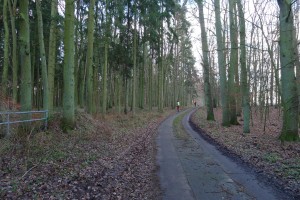 The dozen of us in our group spread out in a line along the edge of the woods, each orange swatch separated from the next by fifty feet or so. Our leader had positioned himself in the middle of the line. He had a “wingman” to the far left and the far right, each with a rifle. When the word was passed down the line, we sauntered into the woods.
The dozen of us in our group spread out in a line along the edge of the woods, each orange swatch separated from the next by fifty feet or so. Our leader had positioned himself in the middle of the line. He had a “wingman” to the far left and the far right, each with a rifle. When the word was passed down the line, we sauntered into the woods.
I quickly lost sight of Annette and Rani, who were stationed several places down to my left. But Henning was on my right, and as I had never been a Treiber before, I did my best to mimic his actions. There wasn’t much to it, actually. Just keep walking slowly forward, trying to maintain alignment with the adjacent Treiber, making occasional whooping noises in case the animals were not getting the message.
The forest was primarily mature hardwoods, mostly beech, with a smattering of oaks and other species. Eventually we would traverse sections of spruce forest as well. This forest, like many I have seen in northern Germany, was largely devoid of undergrowth. This gave the forest a park-like feel, and made walking easy.
After about half an hour, our line of Treiber came to an acre of cleared land that was surrounded by a tall, sturdy wire fence. Young spruce trees were flourishing inside the pen. I was later informed that the fence was to protect the trees from browsing animals. We split our line to go around the spruce nursery, and regrouped on a woods road that ran along the far side.
Since starting our walk through the woods, we had flushed a couple of birds, but that was all.
“Is this typical,” I asked Henning, as we waited for the order to move on, “that we don’t actually see many animals when we are treibing?”
“Doch!” he replied. “We usually see quite a few.” He went on to recount the numerous animals he had seen while treibing on other hunts.
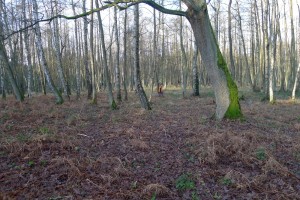 Within minutes of our starting to walk again, I saw a couple of deer bound through the woods ahead of us. Moments later, a shot rang out. My heart flinched. I couldn’t help it, even though I knew that hunts such as this are necessary to maintain the health of deer and boar populations that no longer have natural predators.
Within minutes of our starting to walk again, I saw a couple of deer bound through the woods ahead of us. Moments later, a shot rang out. My heart flinched. I couldn’t help it, even though I knew that hunts such as this are necessary to maintain the health of deer and boar populations that no longer have natural predators.
Eventually the sun poked through the clouds, casting a dappled light across the forest. A soft breeze swooshed through the tree tops. I walked on, lost in thoughts of beauty, life, and death, my reverie occasionally interrupted by echoing gunshots.
I came to a section of brambles, and as I was tromping my way through, I heard shouts from my right. I looked over to see a large wild boar race diagonally in front of me, probably twenty feet away. Its hefty shoulders gave it the look of a miniature buffalo. As quickly as it had appeared, it was gone. Are they dangerous? I wondered. What would I do if the boar was running toward me, rather than away? Such are the thoughts of a novice Treiber.
As the morning wore on, the whooping of our group faded, and our line that had started out so straight and balanced began to devolve into clumps. Aside from the rifle shots, it was turning into a perfect walk through the woods. Why wouldn’t I want to be closer to Annette and Rani, to chat with them, to hold Annette’s hand. Judging by the number of shots we were hearing, I suspected that the hunters were making out just fine. We were still flushing deer — in fact, one almost ran into Rani as it penetrated our ranks. And our left wingman, one of the farmer-hunters, picked off a wild boar near a hunting stand that was occupied by a dismayed aristocrat. The occasional patches of boot-sucking mud or pant-piercing prickers did nothing to dampen the spirits of our band of Treiber — at least, those of us who were not hungover. Our group included a few young men in their late teens, friends of Rani’s cousin Karl, who had apparently overindulged the night before. After about an hour of walking through the woods, they were done-in. But to their credit, they forged on.
By early afternoon, we were on the last leg of the drive. Our path paralleled a woods road, and Annette and I happened to situate ourselves on it. “We’ve got the road covered,” I called out, and noticed that a few of our fellow Treiber also had the road covered, behind us. The road turned out to lead back to where we had parked the cars earlier in the morning.
As I surveyed the group gathered by the cars, I noticed that we had lost a few members of our group. Annette’s uncle Jörg had apparently seen a fellow Treiber ahead of him go down in a patch of quicksand-like mud, and decided that he himself had had enough. Jörg’s whereabouts were later confirmed by cell phone. When I realized that Rani, Karl and one of the young men from Poland had not yet returned, I started to walk back down the road to look for them.
After going a short distance, I heard shouts from off in the woods. One of them sounded like “Help,” but the tone was not desperate. I set off at a jog, and soon saw several patches of orange moving slowly through the woods. It turned out to be Rani, Karl and a Pole struggling to drag a deer by the hoofs through the forest. It was a Dammwild, the larger of the two deer species being hunted. This young buck had been shot cleanly through the chest. His muzzle was moist with blood. I grabbed one leg, Karl had the other, and we dragged the two hundred pound animal to the woods road.
Several other Treiber met us at the road. Those more knowledgeable than I discussed the deer, which had been shot by Der Kleine Baron. Their debate centered on the length of the deer’s two antlers, which were slightly longer than its ears. Apparently the ground rules of this particular hunt forbade the shooting of any deer with antlers longer than its ears. Since these antlers were not much longer, and perhaps also because the deer had been shot by Der Kleine Baron, the consensus in the group was that the deer was “fair enough.”
Rani later explained to me that while Annette and I had been walking the last stretch on the road, Karl had decided that he, the Pole and she should make a final sweep through a particularly dense patch of brambles and brush. This took some doing, and left Rani with scratches and torn clothes. At the far end of the patch, they came across Der Kleine Baron who informed them from his stand that he had shot a deer, and he wasn’t sure where it had ended up, but he thought it was over in that direction. Karl dutifully led his charges in the direction indicated, and they found the deer.
I was not surprised that Der Kleine Baron hadn’t retrieved the deer he had shot, because the hunters were not supposed to leave their stands until the hunt was over. But I was wondering who would butcher the animals that had been shot. It turned out there was a lot of butchering to be done, because the hunt had been quite successful: eighteen Dammwild — the larger deer — had been shot, a dozen Rehwild — the smaller deer, and six Wildschweine — wild boar.
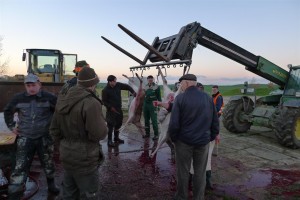
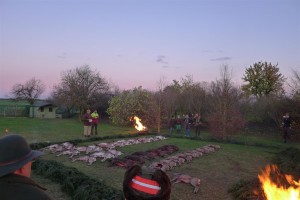 We headed back to Annette’s parents’ house to take a break. When we returned to Klaus’s house later in the afternoon for the ceremonial conclusion of the hunt, the young forester and one of the farmers were just finishing gutting the last of the deer. The rest of the animals were arrayed within a frame of evergreen branches on the lawn beside the house. At each corner of this evergreen frame was a large iron bowl filled with burning logs.
We headed back to Annette’s parents’ house to take a break. When we returned to Klaus’s house later in the afternoon for the ceremonial conclusion of the hunt, the young forester and one of the farmers were just finishing gutting the last of the deer. The rest of the animals were arrayed within a frame of evergreen branches on the lawn beside the house. At each corner of this evergreen frame was a large iron bowl filled with burning logs.
Klaus stood on the far side of the evergreen square. The hunters were on one adjacent side, and Burkhart with his hunting horn was on the other. When the last two deer were laid within the frame, the horn sounded, and Klaus held forth. He reported the overall results of the hunt, thanked everyone for their efforts, and awarded to each of the hunters who had killed an animal a small evergreen sprig for the band of his hat.
I later learned that Klaus had been the most successful hunter that day. With eight animals shot, one at a distance of about 150 meters, he was the Jagdkoenig, or King of the Hunt.
When I asked Annette’s cousin Harald, who had also been hunting, whether Klaus’ success was attributable to his hunting skills, to his choice of hunting stand, or to luck, Harald replied diplomatically “Well, probably some of all three. Klaus is a very experienced hunter; he gets invited to hunts all the time. He also has the –” Harald hesitated, “the confidence to take shots that others might not take.”
The hunt had ended, but the party was not over. All of the guests were treated to a sumptuous dinner in the hunting lodge, replete with toasts and roasts. Annette and I ended up seated at a table with guests whom we had seen at other of Klaus’s parties, but whom we didn’t know. She told me later that they were all “vons,” as in “von Bismark.” I couldn’t tell. Annette also remarked that the German nobility was not as well-represented at this party as at some of Klaus’s others — “there were only a couple of princes and a few dukes invited to this hunt.” During dinner I noticed that the table where The Poles were seated, at which a bottle of vodka had appeared, seemed to be more lively than ours.
I would guess that in Germany, and perhaps in Europe in general, hunting for sport has historically been an aristocratic pursuit. These days, the ranks of hunters here are undoubtedly limited by the difficulty and cost of obtaining a hunting license. The intensive course that one must pass to obtain a Jagdschein is a full two weeks long and costs about $2,000. Access to hunting areas is restricted (it helps to own your own forest), and controls over guns themselves would be considered onerous by American standards (which is not to say that they are unreasonable).
Klaus is a commanding presence with understated but expansive generosity. I was impressed by the group that he had invited to this Jagd Wochenende — not necessarily by the “vons,” but by the overall diversity represented by the participants.
As the dinner party was winding down, one of the hunters, a good friend of Annette’s family, asked me how I had enjoyed the day.
“It was a wonderful walk through the woods!” I replied.
“I really think you should participate again next year — but as a hunter.”
I smiled and agreed that maybe I should, but I was thinking that given the choice between sitting alone in a raised hunting stand all day versus walking through the woods, I’d opt for the latter.
